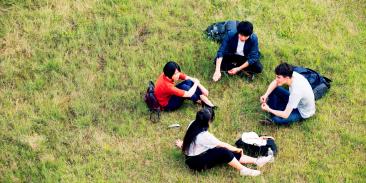6 environmental books you don't want to miss this summer
Not to worry, there are no Trump White House, lead poisoning or overfishing stories on this list. These books are about can-do Americans, our ever-changing landscapes, resilient wildlife and environmental successes you’ve never heard of. And if you add Environmental Defense Fund as your favorite charity when checking out these books, a portion of the book sale will support our work. Enjoy!
1) “Coyote America: A Natural and Supernatural History”
Author: Dan Flores
New Yorkers have spotted them in Central Park and in Harlem. You can hear them howl on Cape Cod and on suburban Louisiana streets. “The tawny, tail-swishing, sharp-nosed wild dog of the American deserts is now our furtive alley predator everywhere from Miami, Anchorage, San Diego to Maine,” Flores writes. That’s because coyotes, instead of succumbing to centuries of cruel extermination campaigns, continue to thrive and to seek out humans as if to test how well we can co-exist. Flores tells the story about the remarkably resilient and smart wild animal in our midst.
2) “Tesla: Inventor of the Modern”
Author: Richard Munson
This book by my colleague Dick Munson is about an American you probably never heard of, but whose inventions you use every day. Nikola Tesla, an electric engineer of Serbian descent, invented the radio, robot and remote control. His electric induction motors run our appliances and factories – yet, he’s been largely overlooked by history. Dick paints an insightful portrait of this farsighted and underappreciated mastermind whose name would eventually inspire a pioneering electric car company.
3) “The Right to be Cold: One Woman’s Fight to Protect the Arctic and Save the Planet from Climate Change”
Author: Sheila Watt-Cloutier
Born in a remote Inuit village in northern Quebec, Watt-Cloutier rose to become one of Canada’s most outspoken and decorated environmental and human rights activists. Her biography is a human story of resilience and survival, as well as a testament to Inuit culture as it faces the biggest challenge yet: climate change. “Like everyone I grew up with, I have seen ancient traditions give way to southern habits,” Watt-Clouitier writes. “I have seen communities broken apart of transformed by government policies…And more shockingly, like all my fellow Inuit, I have seen what seemed permanent begin to melt away.”
4) “Rancher, Farmer, Fisherman: Conservation Heroes of the American Heartland”
Author: Miriam Horn
The five good Americans Miriam Horn – another accomplished writer colleague of mine – interviewed during a journey along the Mississippi River don’t want to be known as environmentalists. Their tireless efforts to restore grasslands, wildlife, soil, rivers, wetland and oceans are about preserving precious resources for their children and grandchildren. They want to protect natural wealth. Miriam’s 2016 book became a Discovery documentary in 2017. Narrated by Tom Brokaw, it aired at the Sundance Film Festival and later on the Discovery Channel.
5) “Wild horse country: The History, Myth, and Future of the Mustang”
Author: David Phillips
A Pulitzer Prize-winning investigative reporter who writes for the New York Times, Phillips wants to know what place wild mustangs should have in the West, “if any?” How come half of these wild mustangs are now held in captivity, he asks. And who decides what’s a “sustainable” number of wild horses on Western ranch lands? Mustangs, these free-roaming mythological American icons, have become a management challenge as they – like the coyote – show surprising survival skills.
6) “A Hole in the Wind: A Climate Scientist’s Bicycle Journey Across the United States”
Author: David Goodrich
After a distinguished career leading the United Nations Global Climate Observing System in Geneva, David Goodrich returned home to the United States in 2011, perturbed to find a nation in denial. An avid bicyclist, he decided to spend a summer on the road. His idea: A little straight talk with people, face to face, could set things right. What he learned instead is that climate change is a complicated issue for many Americans, and that you get a lot farther talking “weather” than you do climate in America’s heartland.












![[alttext]]( /sites/default/files/blog_images/sentinel-5p_and_tropomi_70x70_Voices.jpg) Video: A bold, new initiative to combat global warming – from space
Video: A bold, new initiative to combat global warming – from space
Need to share these with the PBS reading club. They are looking for science and literature combos.
Terry Barber
July 12, 2018 at 1:27 am